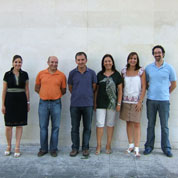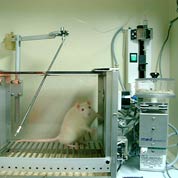Neurofarmacología del Comportamiento Motivado
Introducción
El grupo de investigación Neurofarmacología del Comportamiento Motivado es un grupo recientemente acreditado por la UCM, pero que cuenta con experiencia de más de 20 años en diferentes líneas de investigación, ya que muchos de sus miembros provienen de un bagaje por grupos anteriores. Se trata de un grupo multidisciplinar que trata de abordar y dar una explicación científica a los mecanismos que subyacen al comportamiento motivado desde distintas perspectivas.
Personal asociado al grupo
-
Nombre: Raquel Gómez de Heras
Dedicación al grupo: única
rgomezhe@psi.ucm.es -
Nombre: Fernando Rodríguez de Fonseca
Dedicación al grupo: parcial
ferodrig@psi.ucm.es -
Nombre: Laura Orío Ortiz
Dedicación al grupo: única
lorio@psi.ucm.es -
Nombre: Miguel Ángel Gorriti Irigaray
Dedicación al grupo: parcial
m_gorriti@hotmail.com -
Nombre: Francisco Alén Fariñas
Dedicación al grupo: única -
Nombre: María Teresa Ramírez López
Dedicación al grupo: única
Líneas de Investigación y proyectos en curso
- Mecanismos de ingesta y saciedad. Búsqueda de nuevas indicaciones de fármacos existentes para la obesidad.
- Papel del sistema endocannabinoide en diferentes aspectos del comportamiento motivado.
- Búsqueda de mecanismos y nuevos medicamentos para patologías asociadas con neuroinflamación y neurodegeneración.
- Neurofarmacología de las adicciones a cocaína y alcohol.



Publicaciones recientes
-
Reyes-Cabello C, Alén F, Gómez de Heras R, Serrano A, Rivera P, Orio L, Rodríguez de Fonseca F, Pavón FJ. Effects of the anandamide uptake blocker AM404 on food intake depend on feeding status and route of administration. Pharmacol Biochem Behav, Epub, 2012.
- Orio L, Crespo I, López-Moreno JA, Reyes-Cabello C, Rodríguez de Fonseca F, Gómez de Heras R; Additive effects of cannabinoid CB1 receptors blockade and cholecystokinin on feeding inhibition;Pharmacol Biochem Behav, Apr;98(2):220-6.Epub, 2011
-
Crespo I, Gómez de Heras R, Rodríguez de Fonseca F, Navarro M. “Pretreatment with subeffective doses of rimonabant attenuates orexigenic actions of orexin a-hypocretin 1” Neuropharmacology (2008) 54 (1): 219- 225
-
Alen F., Gómez R, Gonzalez Cuevas G., Navarro M, López Moreno, J. A. “Nicotine causes opposite effects on alcohol intake: evidence in an animal experimental modelo of abstinente and relapse from alcohol” Nicotine& Tobacco Research (2009) 11: 1301- 1311
-
Bermudez-Silva FJ, Viveros MP, McPartland JM, Rodriguez de Fonseca F.“The endocannabinoid system, eating behavior and energy homeostasis: the end or a new beginning?”Pharmacol Biochem Behav. 2010 Jun;95(4):375-82. Review.
-
Orio L., Edwards S, George O, Parsons LH, Koob GF. “A Role for the Endocannabinoid System in the Increased Motivation for Cocaine in Dependence”.Journal of Neuroscience (2009) 15 Abril, 29(15): 4846-4857
-
Fernandez-Espejo E, Viveros MP, Núñez L, Ellenbroek BA, Rodriguez de Fonseca F. “Role of cannabis and endocannabinoids in the genesis of schizophrenia” Psychopharmacology (Berl). (2009) Nov;206(4):531-49. Review.
-
Pavon FJ, Bilbao A, Hernández-Folgado L, Cippitelli A, Jagerovic N, Abellán G, Rodríguez-Franco MA, Serrano A, Macias M, Gómez R, Navarro M, Goya P, Rodríguez de Fonseca F. “Antiobesity effects of the novel in vivo neutral cannabinoid receptor antagonist 5-(4-chlorophenyl)-1-(2,4-dichlorophenyl)-3-hexyl-1H-1,2,4-triazole--LH 21” Neuropharmacology. 2006 Aug;51(2):358-66.
-
Orio L., Wee S, Newman AH, Pulvirenti L., Koob GF. “Dopamine D3 receptor partial agonist CBJ090 and the D3 receptor antagonist decreases progressive ratio responding for methamphetamine in rats with extended-access”. Addict Biol. 2010 Jul;15(3):312-23. Epub 2010 Apr 29.
-
Gomez R., Navarro M., Ferrer B., Trigo J.M., Bilbao A., Del Arco I., Nava F., Piomelli D. and Rodríguez de Fonseca F. “A peripheral mechanisn for CB1 cannabinoid receptor-dependent modulation of feeding”. Journal of Neuroscience, (2002) 22 (21): 9612-9617
-
Moreno-Sanz G., O´Shea E., Orio L, Escobedo I., Gonzalez-Cuevas G., Navarro M., Colado M.I., Lopez-Moreno JA “Administration of MDMA to ethanol-deprived rats increases ethanol operant self-administration and dopamine release during reinstatement”. International Journal of Neuropsychopharmacology (2009) 12: 1-12
-
Wee S, Orio L, Ghirmai S, Cashman JR, Koob GF. “Inhibition of kappa opioid receptors attenuated increased cocaine intake in rats with extended access to cocaine”. Psychopharmacology (Berl). (2009) Sept, 205(4): 565-75.
-
Orio L., LLopis N, Torres E., Izco M., O’Shea E., Colado MI “A study on the mechanisms by which minocycline protects against MDMA (ecstasy)-induced neurotoxicity of 5-HT cortical neurons” Neurotoxicity Research 2010 Aug;18(2):187-99
-
Rodriguez de Fonseca F., Navarro M., Gomez R., Escudero L., Nava F., Fu J., Murillo-Rodriguez E., Desarnaud F.,Guifrida A., Gall C., y Piomelli D. “An anorexic lipid mediator regulated by feeding” Nature (2001) 414: 209-212
